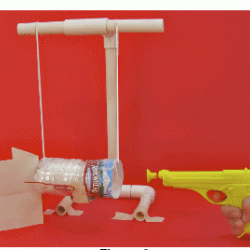Source Institutions
Source Institutions
Add to list Go to activity
Activity link broken? See if it's at the internet archive

In this physics crime lab or demonstration, learners pretend they are criminologists and must find the "muzzle velocity" (speed of the bullet as it leaves the gun) of a gun used to commit a crime. Learners build an apparatus to fire a dart from a plastic toy gun into the open end of a cut-off plastic water bottle which has been stuffed with a plastic bag and suspended as a pendulum. Knowing the mass of the dart, the mass of the water bottle-bag combination, and the vertical rise of the water-bottle bag combination with the dart in it, simple energy and momentum considerations are used to find the muzzle velocity of the dart.
- 10 to 30 minutes
- 1 to 2 hours
- Over $20 per group of students
- Ages 14 - 18
- Activity, Demonstration, Experiment/Lab Activity
- English
Quick Guide
Materials List (per group of students)
- toy dart gun with suction cup darts
- balane
- 1 PVC 1/2 in. pipe, 12 in. long
- 5 PVC 1/2 in. pipe, 4 in. long
- 2 PVC 1/2 in. pipe, 2 in. long
- 3 PVC 1/2 in. 90 degree elbows
- 2 PVC 1/2 in. T's
- plastic water bottle, 500 mL, with top
- plastic grocery bag
- string
- tape, translucent and/or masking
- jumbo paper clip
- 5x8 index card
- washer, steel, 3/4 in (approximate mass 50 g)
- marker pen
- ruler
- scissors and/or utility knife
- calculator
Subjects
-
Mathematics
-
Algebra
- Equations and Inequalities
- Variables and Expressions
-
Data Analysis and Probability
- Data Analysis
- Data Collection
- Measurement
- Number and Operations
-
Algebra
-
Physical Sciences
-
Energy
- Potential and Kinetic Energy
-
Motion and Forces
- Momentum and Velocity
- Projectile Motion
-
Structure and Properties of Matter
- Mass and Weight
-
Energy
-
The Nature of Science
-
The Scientific Process
- Conducting Investigations
- Gathering Data
- Formulating Explanations
- Communicating Results
- Science as a Career
-
The Scientific Process
Informal Categories
- Crime Science
Audience
To use this activity, learners need to:
- see
- read
- touch
Learning styles supported:
- Involves hands-on or lab activities
Other
This resource is part of:
Access Rights:
- Free access
By:
- Rathjen, Don
Rights:
- All rights reserved, Exploratorium, 2008
